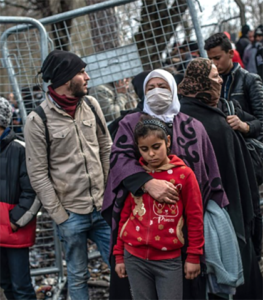Fears for displaced populations as coronavirus spreads
The United Nations made an urgent appeal Tuesday for tens of millions of dollars to help protect vulnerable refugees against the spread of the deadly new coronavirus.
The UN refugee agency UNHCR said it was seeking an initial $US33 million “to boost the preparedness, prevention and response activities to address the immediate public health needs of refugees prompted by COVID-19.”
 So far, there have not been any reports of the virus, which has killed more than 4,000 people worldwide, spreading among communities of refugees and asylum seekers.
So far, there have not been any reports of the virus, which has killed more than 4,000 people worldwide, spreading among communities of refugees and asylum seekers.
But health experts are expressing fears that it could take a devastating toll on countries mired in wars, particularly among displaced populations.
In the Middle East, Iran is experiencing a serious outbreak of the virus – raising fears that it could spread throughout the region into neighbouring countries that lack the health care resources necessary to cope with an outbreak.
“The coronavirus situation has served as a reminder and exposed the poor state of health systems in the region due to destruction by armed conflict, how governments have neglected public health, and how people have to make large out-of-pocket payments to access healthcare in the region,” Cambridge University’s Public Health Institute said in a statement.
UNHCR chief Filippo Grande said there was a need to protect some of the world’s most vulnerable against the disease, which shows mild symptoms in most cases but which often provokes severe illness and death in the weakest individuals.
“The virus can affect anyone and it is our collective responsibility to ensure that the global response includes all people,” Mr Grande said in a statement.
“Allowing full access to health services, including for the most marginalised members of the community, is the best way to protect us all,” he said.
“Everyone on this planet – including refugees, asylum seekers and internally displaced people – should be able to access health facilities and services.”
More than 70 million people globally been forced by conflict, persecution, violence and abuses to flee their homes, including more than 20 million people living as refugees, according to UN data.
Around 84 per cent of the world’s refugees are hosted in low or middle-income countries with weaker health, water and sanitation systems.
“Refugees and internally displaced people often find themselves in places that are overcrowded or where public health and other services are already overstretched or poorly-resourced,” the UNHCR statement said.
Thirty-four of the more than a hundred countries affected by the global COVID-19 outbreak host refugee populations of over 20,000 people.
UNHCR said it was making preparations and laying contingency plans to respond in case the virus begins spreading among refugees, including advising staff to check stocks of medical supplies, equipment, and protective gear.
The heightened risk for displaced people is not only confined to those who remain in war-stricken countries. For refugees who have been resettled in more stable countries, experts worry that costs could be a barrier to treatment or a potential vaccination.
In Lebanon, for instance, hosts more than 1.5 million Syrian refugees. The Cambridge Public Health Institute expressed concerns that the highly privatised nature of the healthcare system could mean refugees could not afford treatment.












